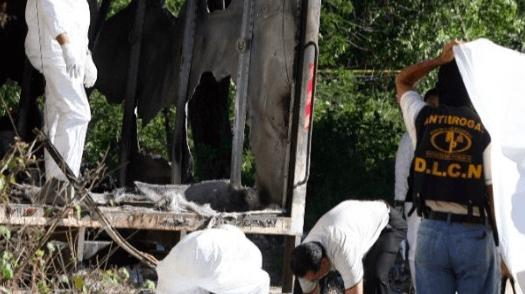A report by teleSur on 10 May 2019 gives details of the 2019 homicide rate in Honduras. Extracts from the teleSur report are given below.

“We cannot place a policeman or military member on every bus.”
The number of violent deaths in Honduras has gone up in April and May, sometimes by a rate as high as 98 percent over figures from 2018.
According to a report by the General Directorate of Forensic Medicine and the National Observatory of Violence of the National Autonomous University of Honduras (OV-UNAH), between Jan. 1 and May 8 of 2019, 1,258 people were murdered – a rate of 10 per day. While the overall number for the year is lower than the 1,340 registered homicides that took place during the same time last, the number of deaths in April and May of 2019 have increased significantly.
April 2019 saw 78 more violent deaths over last April and in the first 8 days of May there were 113 violent deaths, 38 more than those that occurred in the same period of the previous year.
Wednesday (8th) was an especially violent day with 25 murders taking place all over the country according to a report by Criterio. The deaths were registered in cities such as La Ceiba, Choluteca, Danlí, Lepaterique, Teupasenti, El Paraíso, San Pedro Sula and Santa Cruz de Yojoa.
Just the day before on Tuesday at the Central American Security Conference 2019 run by the United States Southern Command, and including Colombia, the Dominican Republic, and Mexico as observers, the head of the Armed Forces of Honduras René Orlando Fonseca had said that Honduras “lives in a climate of peace and security” and that “violence is sporadic.”
This year, 274 homicides were reported in January, 258 violent deaths in February, and in March there were 251 homicides, figures below those registered in 2018 during the same period.
Those three encouraging months of reduced homicides in the country were overshadowed, however, by the high incidence of deaths in April and the start of May.
Spokesman for the Secretariat of Security Jair Meza, a high ranking police official, attributed the increase in violent deaths to “gangs and gangs linking up to acquire territories for the sale of drugs in different neighbourhoods.” Meza argued that another factor causing the high incidence of homicides is extortion, mainly in the transportation sector.
According to Sepol (the Police Statistical System), last Wednesday the driver of a local bus was executed on the Boulevard del Norte, apparently because of extortion.
“We cannot place a policeman or military member on every bus,” says Meza.